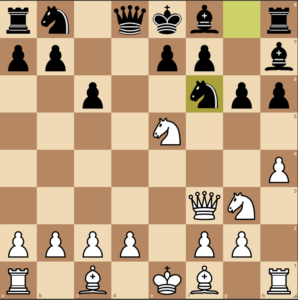Throughout my career, I was always happy when my opponents opted for sidelines in the Opening. I interpreted this as respect for my preparation. And there usually is a reason why a sideline isn’t played that often.
So why shouldn’t I be happy?
I only recently realized that some players are actually afraid of sidelines. They fear some weird trick line and thus spend way too much time analyzing and repeating lines that will most likely never happen.
The difference?
My practical, no-nonsense approach to sidelines. You don’t need to find the best move for every sideline. You just need to get a position you like with as little unnecessary theory as possible. Then you can once again focus on the main lines because, by definition, you will face those much more frequently. In this article, I will my approach to facing sidelines. This approach will help you get better sleep before each game and get nice positions as well.
Why Someone Plays Sidelines
To understand my approach better, let’s look at sidelines for what they are:
- Not played too often (at your level)
- Not the best continuation according to modern theory
It is important to note that sidelines can vary for different levels. The main aspect is that you won’t face them often. And that means you should not spend too much on them.
Practical Approach Against Sidelines
The key is to be as efficient as possible. You have so many things to work on that you can’t allow yourself to spend too much time on sidelines. My mindset is:
With White: How can I get an enjoyable position with simple, logical moves?
With Black: How can I equalize without having to know too much theory?
This has saved me countless hours over the years. I’m not only analyzing fewer things that don’t happen often, but I also have to review way less than other players. In case such a sideline happens I might not have the most precise answer, but nevertheless, a good one I won’t forget easily.
Caro Kann Sideline
To bring home the point, let’s look at a sideline from an opening course a student of mine followed. In a position that happens very infrequently, White has already a huge advantage with many different moves.

The course suggests following the Engine line, which is totally insane and hard to remember: 10.Qb3 Qd5 11.Qxb7 Qxe5+ (losing a piece with a check, what?!) 12.Be2 e6. Now taking the free rook on a8 is wrong… and you should play 13.a4!!, good luck finding that.
Obviously, my student couldn’t remember anything and deviated early on. He thought he should remember his theory better. But I did not agree. The choice given in the course is just not practical. If you have a move that is logical and gets a big advantage, you should not look further! 10.Bc4, white is much better, and that’s it.
So the problem was the line given in the course, not the memory of my student. The difference between +2.5 and +1 in a practical game below Master Level is not as big as it might seem. And you aren’t even sure you will ever face this line. And you don’t know if you will remember all the details.
You can have a look at the different lines and my comments on them in my Lichess study.
Keep It Simple (REALLY)
By having too many sidelines to remember, most players get overwhelmed. They feel they need to remember 500 lines in order to sit down at the board and play. This is not a fun state to be in. So whenever you analyze sidelines in Chess openings, take the simple and logical approach.
Having +1.5 instead of +0.5 won’t change the outcome of the game. What will is:
- Having a calm mind before the game
- More energy due to less repetition of lines
- Logical positions with logical moves